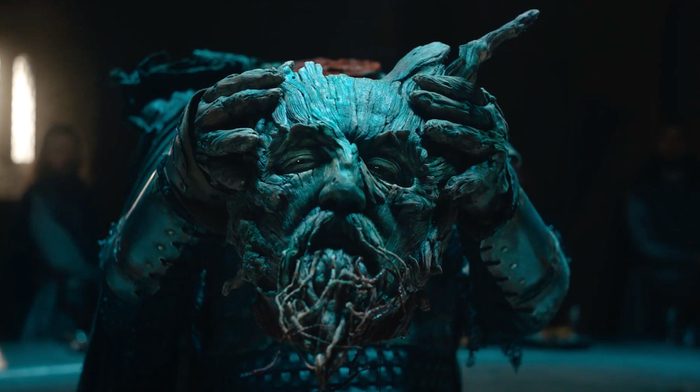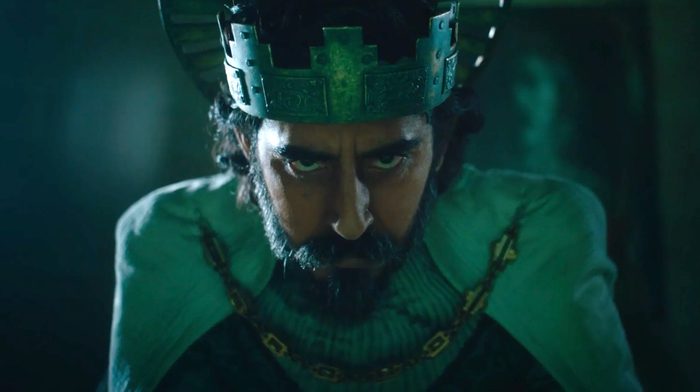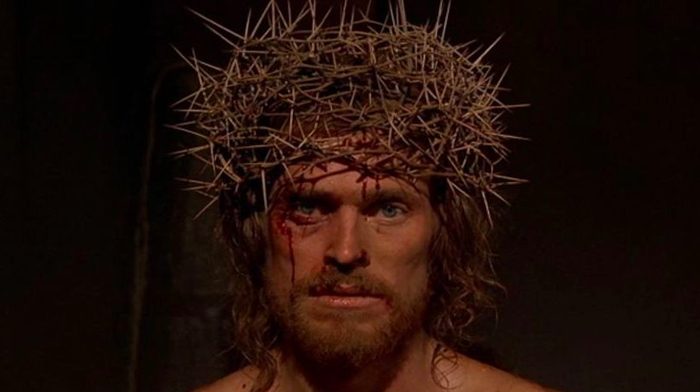'The Green Knight' Ending Explained: David Lowery Turns To A Martin Scorsese Classic To Conclude His Thoughtful Fantasy Epic
The Green Knight has been out for over a week now, so I think it's safe to start talking about the film's beautiful, bewitching ending. I've seen some proclaim the finale to be "confusing," but I respectfully disagree. Director David Lowery cloaks the final moments of his fantasy epic in mystery, but everything you need to truly know is there, waiting for you. And it helps if you've seen a particular Martin Scorsese movie, too.Spoilers for The Green Knight follow. 
The Green Knight
For The Green Knight, writer-director David Lowery draws on the 14th-century poem Sir Gawain and the Green Knight and sticks pretty close to the source material. At least at first. We're introduced to Gawain (Dev Patel), nephew of King Arthur (Sean Harris). Gawain wants to be a knight in Arthur's court, but he also doesn't seem motivated to do much of anything. He sleeps late, drinks heavily, and carries on an affair with a commoner named Essel (Alicia Vikander). Gawain's mother (Sarita Choudhury) eyes her son reproachfully and wants him to get his act together – because no matter what the century, mothers are disappointed.
It's Christmas (which means The Green Knight is officially a Christmas movie now, so get lost, Die Hard), and the festivities are cut short when a hulking Green Knight (Ralph Ineson), more tree than man, storms into the castle and challenges someone, anyone, to a game. The game: someone is free to strike the Green Knight in any manner he pleases. The attacker can give the Green Knight a little scratch, or chop off his big green head. But here's the catch: whoever inflicts the blow on The Green Knight has to promise to seek The Green Knight out a year later and submit to the same exact blow.
Arthur appears outraged at all of this, but he's also too feeble and weak to take up the game himself. Who among his brave knights will accept The Green Knight's challenge? No one seems particularly interested (where you at, Lancelot?!). No one except Gawain, who sees this as an opportunity to impress his kingly uncle. And so Gawain takes up Arthur's sword (the word "Excalibur" is never said; nor is the name Arthur – he's simply credited as "King") and promptly chops The Green Knight's head off in one fell swoop. And that's it, the movie is over.
Oh, wait, no, there's more. The Green Knight picks up his severed head, tells Gawain to come find him in a year, and then laughs his ass off as he rides away holding his head like the Headless Horseman in Sleepy Hollow. A year passes, and Gawain is encouraged to honor his agreement. He seems hesitant at first, and who can blame him? After all, this was supposed to be a game. But Gawain also made the mistake of chopping the Knight's head off instead of giving him a simple, harmless scratch. Had he done that, the challenge wouldn't be much of a challenge. Now, though, Gawain is faced with having his head cut off.
Gawain agrees to go on the quest and is given a special protective girdle by his mother. She tells him that as long as he wears the girdle he'll be unharmed. Gawain's quest has him encounter several characters, some fantastical, some antagonistic. Eventually, he ends up at a castle where the Lord (Joel Edgerton) and Lady (Alicia Vikander again) both want to kiss him – and who can blame them? Have you seen Dev Patel? Easy on the eyes, that fellow!
Finally, Gawain makes his way to the ruined chapel where the Green Knight awaits.
The Green Knight Ending Explained
When The Green Knight awakens from his slumber he orders Gawain to kneel so he can chop his head off. Gawain obliges, at first, but he's understandably very worried. The Green Knight seems perplexed by this – a deal's a deal, after all. "Let's get to hacking!" The Green Knight says, which is also what I say every time I log onto my computer. Just as he's about to deliver a blow, Gawain stops him, asking: "Is this really all there is?"
"What else ought there be?" The Green Knight replies matter-of-factly. Once again, Gawain readies for the blow – only to then flee, running away, finding his horse, and riding back home. It seems almost anticlimactic at first, but the story isn't through. In rapid succession, we're treated to a montage. Gawain comes home and impregnates Essel. Arthur dies, and Gawain is crowned king. Essel gives birth – and the baby is quickly snatched away by Gawain's knights. He's a king now, and there's no way a king can marry a commoner.
Instead, Gawain enters into a marriage with a noblewoman, and they raise the child together. But while Arthur's time as king seemed rather chill, with everyone sitting around slopping up wine, Gawain's reign doesn't go so smoothly. The years pass, a war begins, and Gawain's son ends up killed in battle. Any trace of honor or duty that we saw in Gawain is gone, and he becomes a tyrant. And all the while, Gawain keeps wearing that magical girdle from his mother.
Eventually, enemies lay siege to the castle. Gawain, realizing how much he's failed as a leader, undoes the girdle – at which point his head falls off, as if he were the girl with the ribbon in that classic scary story. Here, we're suddenly thrust back to the moment where Gawain is awaiting The Green Knight's ax blow. Everything we've just seen has been fantasy, or dream, or vision – take your pick. Gawain now removes the girdle and tells The Green Knight he's ready, and The Green Knight commends Gawain for his bravery, adding: "And now, off with your head." The implication is clear: Gawain will die, but he'll die with honor instead of becoming the powerful but flawed king he saw in his vision.
The vision scenario has thrown some people off, and so have The Green Knight's motives. In the film, we see The Green Knight is no random character. Instead, it's heavily implied that Gawain's mother, who dabbles in witchcraft, has summoned him. This is partially inspired by the story, where it's revealed that The Green Knight is actually the Lord – the one played by Joel Edgerton – in disguise, transformed by Arthurian villainess Morgan le Fay.
For the film, Lowery decided to make Gawain's mother into Morgan le Fay (even though, like Arthur, we never hear her name spoken aloud). "In the book, you get this deus ex machina appearance by Morgan le Fay and she's like, 'I was behind everything,'" Lowery said. "She's vital to the story, but she really only shows up in the last two or three pages of the text. I definitely wanted to avoid that...It became a drama about a mother and a son in a way that I hadn't intended. All of a sudden, I was writing about my own relationship with my mom, and the fact that I stayed, I lived under her roof for far longer than I should have. I had failure-to-launch syndrome, and she eventually had to force me out."
Lowery added:
"She gives him the [protective] girdle. Is that in opposition to what she's done in the Great Hall on Christmas morning? The answer is that it's just messy. I think about that in my relationship with my mom. It's just a messy relationship, and probably not exclusive to my own relationship with my mom."
The Last Temptation of Gawain
I've seen more than a few people express befuddlement at the ending, but to me, it made sense. I'm not saying that to brag about my own intelligence (I'm a dummy!). No, the reason I didn't have much trouble with the ending is that it borrows heavily from Martin Scorsese's The Last Temptation of Christ. Curiously enough, I have yet to see Lowery address this anywhere in interviews (unless I'm a missing one), but it's unmistakable.
Near the end of Scorsese's film (based on the novel by Nikos Kazantzakis), Jesus has been crucified when he's suddenly presented with the option of coming down off the cross and living the rest of his life as a normal man. Jesus accepts and soon marries and has children. He grows older and one day finds someone preaching about his story – and claiming that Jesus died on the cross. Jesus insists that isn't true, but it doesn't matter – a good story is a good story.
Jesus is soon on his deathbed while the Jewish Rebellion against the Romans rages on outside. Jesus is visited by his apostles, including Judas, who chastises him for not accepting his fate on the cross, and adds that it was the devil in disguise who tempted Jesus to give up on dying. Jesus realizes he's made a mistake, and suddenly, he's back on the cross again – and ready to die in order to forgive the sins of the world (or so the story goes).
It's the same basic idea: yes, Jesus and Gawain could've survived their fates and lived on to old age – but would those be lives worth living? Is it better to die with honor and dignity, or continue down a flawed path? There are probably folks who look at that question and think the answer is obvious: between life or death, you choose life, duh. But remember, The Green Knight is steeped in Arthurian legend and chivalric tradition. These are not modern characters with modern thoughts. They live and die by the sword, and honor is everything. Gawain may be about to go to his grave, but he will do so having known he did the right thing.


